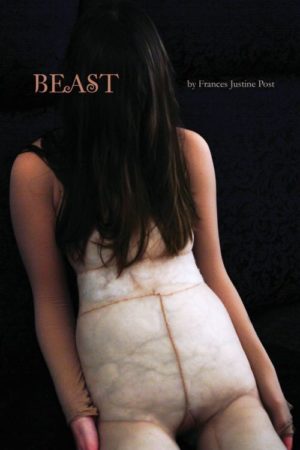In Their Own Words
Frances Justine Post's “Self-Portrait in the Body of a Whale”

Self-Portrait in the Body of a Whale
We come upon the body of a whale, a fresh beaching.
It smells like a thousand fishes.
I crawl in on the carpet of its tongue, seeking the injury out.
Outside, you cough and look away as I squint
through the eye at you. I dig into the room
its ribs make and squat in the warm gloom. The heart,
a chandelier, hangs down, ringed with veins. Here and there
the skin, thinned by hermit crabs, lets in the light
like a stained glass window with blood red panes.
I lie down on the bed of its liver as the tide fills the body,
each wave, higher. You give the whale a kick
I almost didn't feel and gesture towards the dunes,
backing away, disappearing. Is this who you really are?
This is where I live now like a barnacle,
stern and grumpy. If you try to move me, I will cut you.
From Beast (Augury Books, 2014). All rights reserved. Reprinted with the permission of the author.
On "Self-Portrait in the Body of a Whale"
"Self- Portrait in the Body of a Whale" is telling the truth only in the first line, the rest is imagination. I did "come upon the body of a whale" on a trip to Block Island off the coast of Rhode Island in the middle of winter. There is nothing I love more than an island in winter. It is the only time you can have a whole beach to yourself. To me it is heaven. I grew up on an island, so perhaps that is why I feel so strongly about this.
I took the trip with my boyfriend at the time. The island was basically shut down so it felt like we had the whole place to ourselves. I remember everyone we met asking us if we had seen the beached whale. I kept picturing this huge animal dwarfing beach, and, even though I knew it might make me sad, I wanted to see it. We walked down the beach, but didn't see anything remotely whale-like until we came upon this sort of carpet of flesh. It was a whale carpet. The body was so broken down that all that was left was this huge, flat mass of skin, covering bones, half on the beach and half in the water. It was not as disgusting as it sounds and was, in fact, kind of beautiful. It was bleached white by the sun with darker stripes in a wave-like pattern. It had probably been on the beach for weeks, if not months. Now I wonder how it must have felt for the Islanders to live with this decaying body for months. Was it too big to move, so they just had to wait for it to naturally decompose?
A couple of years passed before I wrote the poem. For a long time, I just kept saying to myself, "We come upon the body of a whale." Instead of writing the experience as it really happened, I wrote the experience as I would have liked it to happen. Anytime anyone inhabits a whale, there are of course the biblical, Jonah implications, but for me it was more a fascination with the actual physical body of this creature. My Dad is an ornithologist, so he was always skinning and stuffing birds at the kitchen table. You would look in the freezer for ice cream and out would fall an owl. Because I grew up like this, I am perhaps more at ease with the grotesque than many. Lots of poems in Beast focus on the mechanics of the body, the meat of the body, particularly the heart. The heart is used as symbol and metaphor in so much of poetry, but it's also just a machine that pumps blood and keeps us alive somehow. I will be endlessly fascinated with that.
The last line always makes me laugh. It is serious, but also silly and is supposed to be read both ways. Barnacles do seem grumpy to me. Little frowny creatures. They are tiny, so they have to make their presence known. They just sit there on the rocks and cut you if you dare sit on them. Little jerks. I love them.




